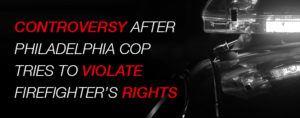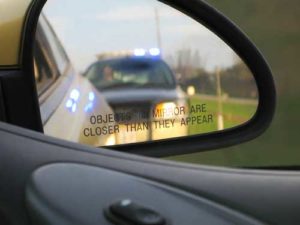 On March 25th, Philadelphia firefighter uploaded a video of a traffic stop to the internet that has caused major conflict between Philly’s fire departments and police departments to develop. Police Officer Holloway pulled over firefighter Tony Soto, stating that the stop was because Soto had tinted windows on his car. Soto—fortunately—had his cell phone perched on a dash stand in his vehicle and was able to record the entire encounter.[1]
On March 25th, Philadelphia firefighter uploaded a video of a traffic stop to the internet that has caused major conflict between Philly’s fire departments and police departments to develop. Police Officer Holloway pulled over firefighter Tony Soto, stating that the stop was because Soto had tinted windows on his car. Soto—fortunately—had his cell phone perched on a dash stand in his vehicle and was able to record the entire encounter.[1]
No Valid Reason For The Stop
Soto informed the officer that he had the proper state permit that allowed him to have tinted windows and he presented the permit through the window. In theory, the encounter should have ended there and Officer Holloway should have returned to his car and sent Soto on his way, as the law regarding when a police officer can lawfully pull you over is specific. A traffic stop is considered to a “seizure” for constitutional purposes and, because the 4th Amendment[2] protects individuals from unreasonable search and seizure, a law enforcement officer is required to have at least a reasonable suspicion[3] that a driver is engaging in unlawful activity in order to pull them over. If an officer has reasonable suspicion that a driver was breaking the law and then, upon approaching the vehicle or speaking to the driver, realizes the suspicion was erroneous, the encounter should end right there and the driver should be free to leave.
Officer Holloway, however, quickly changed the reason for the traffic stop, suddenly claiming that he stopped Soto for having a headlight out. Soto turned on his headlights and showed Officer Holloway that both of them did, in fact, work. Regardless, Officer Holloway ordered Soto to get out of his vehicle, tried to open the car door, and asked if there were any firearms in the car.
Soto refused to get out, informing the officer that he was violating Soto’s constitutional rights since there was no valid reason for the traffic stop. Words were exchanged between the two though Soto remained calm and professional the entire time and was not combative or threatening. Soto requested to see a supervisor, who never appeared on the scene. Instead, the police got into their car and pulled across the street, simply waiting for quite some time. Soto stated he was afraid they would charge him with fleeing the scene if he drove away, so he remained in his stopped car for over 20 minutes until the officers drove away.
The Harassment Continues
Since Soto posted the videos of the encounter (which are in three installments), he claims that some police have continued to harass him and have even threatened him. Officers alleged to local media that Soto was trying to “bait the police,” despite the fact that Officer Holloway was, indeed, the one who initiated the encounter. The day after the incident, police cars were parked outside of Soto’s home and he states they made threats on his life via Facebook. Soto did note that some officers reached out in support of him, however.
While fellow firefighters are outraged by the incident and calling for a stand against unlawful police power, Officer’s Holloway’s police department seems to believe that everything that happened was routine and that no officers were out of line. The department has as of yet refused to launch an investigation regarding the encounter even though video evidence exists and an investigation could be relatively simple. Additionally, Philadelphia Police Lieutenant Stanford stated that “the officers showed tremendous restraint” and that they should have “ripped” Soto from the car.
Was The Stop Racially Motivated?

Under many circumstances, when a law enforcement officer does not have a valid reason for a traffic stop, the officer is targeting the driver for another reason. There have been many allegations across Philly and the United States in recent months and years of police officers specifically targeting black individuals for traffic stops, believing that the individuals may have unlawful substances in the car or may have active arrest warrants. This type of racial stereotyping and targeting is not only wrong but goes against a person’s basic constitutional rights.
Though Soto states that he believes Officer Holloway pulled him over and tried to wrongfully continue the traffic stop because he was black, he also stated that “police corruption and power abuse is beyond race.” Anyone—no matter what their race, age, gender, or religion may be—should be free from police abuse and has the right to file a legal claim against the police department for rights violations.